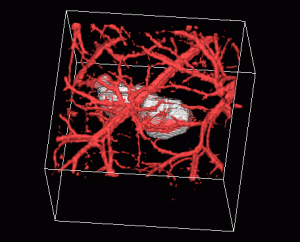SUNDAY, 20 MAY 2012
50,000 people are diagnosed with breast cancer in the UK annually – on average someone every 10 minutes, and although around 12000 people die from the disease each year, early diagnosis can vastly reduce mortality rates. Researchers at the University of Twente in the Netherlands have developed a new screening technique that will hopefully improve early diagnosis and hence increase survival. Whilst current X-ray mammographies are usually effective they can gives false results and some are concerned about exposure to ionising radiation.The team have developed an instrument called the Twente Photoacoustic Mammoscope (PAM) that combines photoacoustics- a technique which uses optical and acoustical imaging to visualise tumours using long wave radiation, and ultrasound, which enables them to target the photoacoustic technology to a specific area. The PAM device can be built into a hospital bed where a patient lies down and has their breast scanned with laser light.
Cancers contain more blood vessels than healthy tissue and hence more haemoglobin (which preferentially absorbs long range light). Due to the increased light absorption, the temperature of the malignant tissue rises slightly and the resulting thermal expansion generates a pressure wave which can be detected by an ultrasound detector placed on one side of the breast. The photoacoustic signals are then analysed by the PAM device which creates an image of the scanned tissue.
Although still in the early stages of development, researchers at Twente showed that cancerous tumours in their 12 test patients produced a distinct photoacoustic signal which showed a greater contrast than images generated by the usual X-ray mammographies. Michelle Heijblom, a Ph.D student involved in the research believes that despite a few technical improvements that need to be made, the PAM device has a lot of potential for the future, citing it as a “safe, comfortable and accurate alternative” to the current methods of diagnosis.
Written by Milly Stephens
DOI: 10.1364/OE.15.012277

